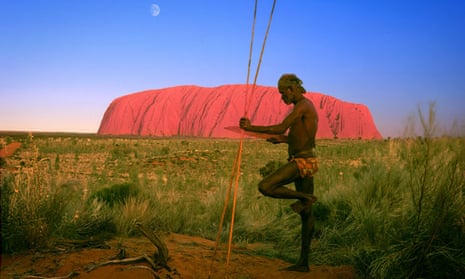The federal Department of Environment will shed a quarter of its staff and look to generate “alternative funding models” from some of Australia’s premier natural spaces in an attempt to save $100m.
Environmental groups say the plans could mean areas including Uluru, Kakadu and the nation’s Antarctic territory being opened up for development.
An internal government review, seen by Guardian Australia, says the department’s budget will be slashed from $460m in 2013-14 to $361m in 2017-18, requiring the loss of 670 jobs – a quarter of the department's workforce.
The review says 480 further job losses will be necessary over the next three years. The department has already confirmed there will be 250 voluntary redundancies by Christmas this year.
The review document states that while the majority of the budgetary savings will be made through staff cuts, the department will need to focus on “exploring other sources of funding for some functions”.
Specifically, the review states that “alternative funding models” could be “pursued for a number of the department's activities, particularly in Parks Australia and the Australian Antarctic Division”.
Environmental groups claim this could mean the creation of huge resorts in national parks, or even the ending of the long-standing ban on mining in Antarctica.
According to sources at staff meetings held in Darwin and Hobart on Tuesday, the department’s management said there were no commercial plans at present, but business sponsorship and philanthropy were being considered.
Parks Australia oversees six federal national parks, including Uluru and Kakadu, as well as Australia’s network of marine reserves.
The review document also opens the way for departmental functions to be shut down, potentially including research operations in Antarctica.
The report states: “It is not possible in the current budget context for the department to continue business as usual.
“During consultations, staff indicated that it would be preferable to cease or modify some activities rather than continue to undertake the same range of functions with fewer resources.”
The report also indicates that the government is bracing itself for a raft of legal challenges from community and environmental groups against its decisions. The department’s legal costs in the 2013-14 period are estimated to be close to $1m – more than was budgeted.
“The department expects to receive more claims against it in the near future,” the report states. “In the period between November 2013 to January 2014, the department received a high number of requests for Statements of Reasons for various EPBC Act decisions, which often precede a party commencing legal action.”
The report reveals that staff believe the department needs a clearer role, particularly in light of the government’s decision to devolve environmental approvals to the states. It adds that some staff are concerned that the department’s reputation could be damaged during the handover.
The Community and Public Sector Union has decried the job cuts, claiming they will hinder the ability of the department to do its job properly.
Lyndon Schneiders, national director of the Wilderness Society, told Guardian Australia that the departmental changes made him “very nervous”.
“The prime minister has made it clear that nature comes second to short-term economic needs and we have an environment minister who is the cheerleader for the stripping away of a World Heritage area, so it’s very worrying,” he said.
“They just don’t seem to value nature so I imagine anything will go as long as it makes a financial return. That could mean the commercialisation of species, putting up huge resorts, who knows.
“There’s been a long bipartisan opposition to mining in Antarctica, but I could easily see these guys overturning that.
“There’s a great wealth of knowledge and experience in government that has been gutted from one end of the country to the other in state and federal environment departments. We’ve almost got a voluntary system in place now, where business is told there no oversight for what they want to do.”
Schneiders added that the government was right to expect an escalation in legal challenges, with the Wilderness Society and other groups currently working on court action against “bad decisions”.
The Department of Environment was contacted over the leaked document but would not comment other than to confirm the voluntary redundancy round for 250 staff.
